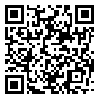BibTeX | RIS | EndNote | Medlars | ProCite | Reference Manager | RefWorks
Send citation to:
URL: http://dsme.hums.ac.ir/article-1-437-en.html


 , Bibi Bibi Mona Razavi
, Bibi Bibi Mona Razavi 

 , Mehrdad Sayadinia
, Mehrdad Sayadinia 

 , Majid Vatankhah
, Majid Vatankhah 

 , Pourya Adibi
, Pourya Adibi 

 , Tayyebeh Zarei
, Tayyebeh Zarei 


Background: As medical education continues to evolve, it is essential to analyze the trends and patterns of research collaboration in this field. This study aims to examine the evolving body of research on electronic medical education, with a specific focus on publications by Iranian researchers.
Materials and methods: This study employed a bibliometric approach to analyze the research publications of Iranian authors in the field of medical e-learning, as indexed in the Web of Science database. Data was collected from 2005 to 2024 and analyzed using bibliometrix R in January 2024.
Results: This analysis encompassed 270 articles from 135 sources, with an average age of 4.85 years and an average of 9.393 citations per article. The dataset included 9689 references and 533 keywords. Among the 1033 authors, each article had an average of 4.61 co-authors, indicating a lack of international collaboration. Tehran, Shiraz, Mashhad, and Iran University of Medical Sciences were the most prolific institutions. The limited collaboration network suggests a decentralized research community.
Conclusion: This bibliometric study highlights the significant impact of the COVID-19 pandemic on medical education research, particularly in Iran. While the study identifies a substantial increase in research output, it also reveals a limited degree of domestic and international collaboration among Iranian researchers. The findings underscore the need for stronger collaborative efforts to advance the field of virtual medical education.
Received: 2024/01/16 | Accepted: 2024/05/19 | Published: 2024/06/19
| Rights and permissions | |
 |
This work is licensed under a Creative Commons Attribution-NonCommercial 4.0 International License. |





